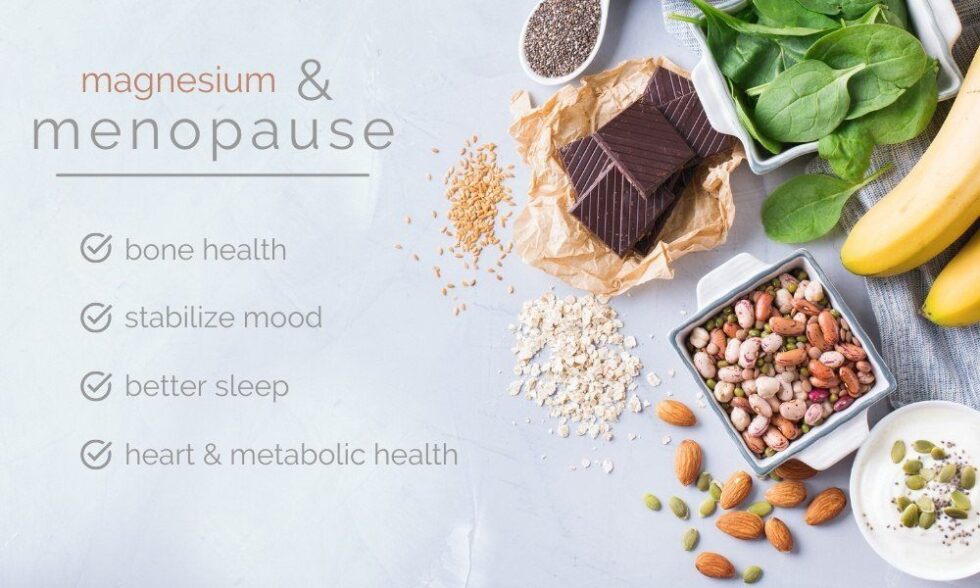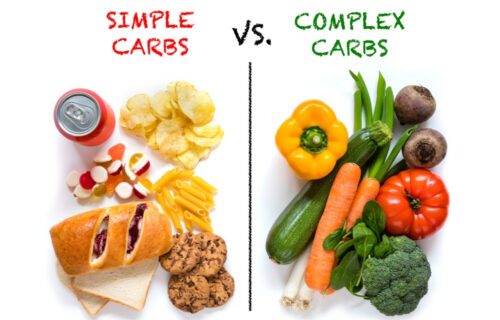
Magnesium for Menopause
Can Magnesium Help Relieve Menopause Symptoms?
Magnesium is an important mineral in the human body (1).
It influences mood regulation, supports healthy bones and hormone levels, and is involved in hundreds of biochemical reactions throughout your body (1).
What’s more, as women reach older adulthood and experience menopause, magnesium becomes particularly important for good health and may even help reduce menopause symptoms.
I want to explain the connection of magnesium and menopause, including its benefits, side effects, and ways to get it in your diet.
Menopause and health
Menopause is a natural phase in a woman’s life that occurs at the age of 51–52, on average, though it can occur many years before or after (2).
It’s characterized by a loss of menstruation along with other symptoms, such as hot flushes, difficulty sleeping, weight gain, decrease in bone and muscle mass, and changes in hormones — namely estrogen and progesterone (3, 4, 5, 6).
Because of the importance of maintaining a healthy weight along with strong bones and muscles, it’s important to address these issues early on in menopause.
Magnesium and bone health
Approximately 60% of your magnesium is stored in your bone and plays a crucial role in preventing osteoporosis. Osteoporosis affects between 10–30% of postmenopausal women and increases with age (7, 8, 9, 10).
Bones undergo a natural remodelling process known as osteogenesis to strengthen themselves. During this stage, bones are broken down by osteoclasts and then rebuilt by osteoblasts. For young people, bones are rebuilt faster and more effectively (2).
During menopause, estrogen levels decline, leading to a spike in osteoclast activity (bone loss). As a result, bones are being broken down at a faster rate than they’re being rebuilt, leading to weakened, porous bones (2).
Magnesium deficiency is highly associated with osteoporosis due to its important role in cartilage and bone matrix calcification, or increased bone strength. It’s also linked to lower activity of parathyroid hormone (PTH) and vitamin D, both of which are crucial for bone development (7).
What’s more, low magnesium appears to decrease osteoblast activity and increase inflammation, making bones weaker over time (7).
Elemental magnesium is the actual amount of magnesium in a supplement. Most supplement containers list the weight of the supplement, such as 1,000 mg, which includes all ingredients. Look for “elemental magnesium” on the nutrition label to know how much you’re getting.
In a 7-year follow-up study in 73,684 postmenopausal women, a high intake of 334–422 mg or greater of magnesium from food or supplements was associated with greater bone mineral density (12).
Since magnesium plays a key role in bone health, ensuring adequate magnesium levels may slow the rate of bone loss.
Other benefits
May improve sleep
Up to 60% of menopausal women experience insomnia or difficulty sleeping. Compared with premenopausal women, those transitioning through menopause, known as perimenopause, report significantly higher rates of poor sleep — in particular, waking up throughout the night (6).
Hot flashes, night sweats, anxiety, depression, and a decrease in melatonin and progesterone, two hormones that have sleep-promoting effects, appear to be the main causes of menopausal insomnia.
Lack of sleep is connected to an array of coexisting conditions related to menopause, such as irritability, depression, stress, and weight gain.
Magnesium may promote sleep by regulating your body’s circadian rhythms, (the body’s natural clock), and increasing muscle relaxation. Furthermore, low magnesium intake is associated with fewer hours of sleep and overall lower sleep quality.
Studies have shown that supplementing with magnesium leads to a significant increase in sleep duration, sleep quality, and melatonin production.
May lower your risk of depression and anxiety
Depression is a common symptom among perimenopausal and postmenopausal women. Though it’s related to many factors, ensuring adequate magnesium levels may alleviate depressive symptoms.
Magnesium plays a key role in brain function, mood regulation, and stress response, which may affect the progression and onset of depression and anxiety (20, 21).
Furthermore, some research has found a link between magnesium deficiency and increased anxiety (23).
Supports heart health
Heart disease is the leading cause of death in postmenopausal women (26, 27).
Though menopause does not cause heart disease, postmenopausal women are at an increased risk of high blood pressure, triglycerides, and levels of LDL (bad) cholesterol due to factors like decreased levels of estrogen, stress, age, and poor lifestyle habits (27).
What’s more, lower levels of magnesium are linked to poor heart health. In one study in 3,713 postmenopausal women, high magnesium levels were associated with lower inflammatory markers related to heart disease, indicating better heart health (28, 29).
Magnesium helps control heart muscle contractions and nerve impulses, allowing for a healthy heartbeat. What’s more, magnesium-rich foods are a significant source of antioxidants, healthy fats, protein, and fibre, all of which benefit heart health (30).
SUMMARY
Magnesium from food and supplements may help reduce common symptoms of menopause, such as difficulty sleeping, depression, anxiety, and heart disease risk.
Food sources
Magnesium is found in many foods, making it easy to incorporate it into your diet. Foods high in magnesium include (34):
- almonds
- avocado
- bananas
- beans (black, red, white)
- broccoli
- cashews
- dark chocolate
- fish, such as halibut, mackerel, and salmon
- leafy greens, such as spinach and Swiss chard
- nuts, such as almonds or cashews
- oatmeal
- seeds, such as pumpkin, sesame, or sunflower
- soybeans
- tofu
- whole grains, including breads, pastas, or brown rice
Despite the many magnesium-rich foods available, most people do not get enough magnesium through diet. This is mostly due to the reliance of overly-processed foods and a lower intake of beans, lentils, vegetables, and whole grains.
Supplements
Magnesium supplements are available over the counter or online.
There are many forms of magnesium, such as magnesium aspartate, carbonate, citrate, glycinate, lactate, malate, and orotate. It’s also common to see magnesium paired with calcium, another important mineral for bone health.
Magnesium aspartate, citrate, chloride, and malate are known for being the most bioavailable — or best absorbed — in the body to replenish magnesium levels. Still, your healthcare provider may suggest other types depending on your specific needs.
SUMMARY
Magnesium is found in many foods, such as dark chocolate, leafy greens, nuts, seeds, and whole grains. It’s also available as an individual supplement, paired with calcium, or in a multivitamin.
The bottom line: Magnesium plays a vital role in health throughout all life stages.
During menopause, it’s important for keeping bones strong and preventing osteoporosis. Magnesium may also reduce unwanted side effects of menopause, such as difficulty sleeping and depression while supporting heart health.
Getting enough magnesium each day is important for your overall health and may reduce unwanted symptoms of menopause.



